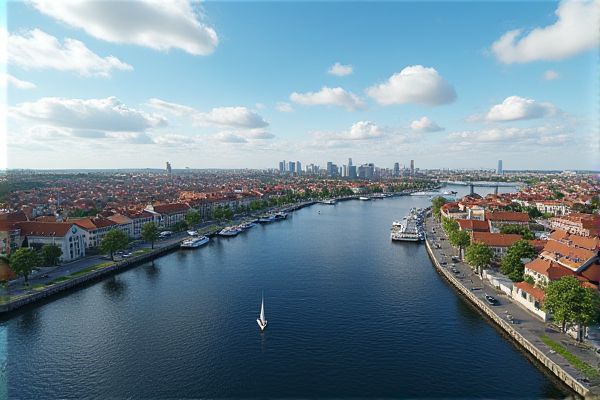
What to know as new resident in Denmark: Register for a CPR number. Understand the Danish healthcare system. Learn basic Danish language. Familiarize with Danish public transportation. Know local laws and regulations. Research about Danish tax system. Get used to cycling culture. Explore Danish workplace etiquette. Join a local community or club. Discover Danish cultural traditions.
Register for a CPR number.
To register for a CPR number in Denmark, you must apply online after obtaining an EU registration certificate or residence permit, provide a permanent address, and appear in person at a Citizen Service Centre with required documents such as a passport, proof of address, and employment contract. This registration is mandatory if you plan to stay for more than 3 months (6 months for EU/EEA or Nordic citizens) and is essential for accessing healthcare, opening a bank account, and other services. For more detailed information, you can visit the CPR Registration in Denmark webpage. This process ensures that you have access to all necessary services during your stay.
Understand the Danish healthcare system.
As a new resident in Denmark, you should know that the healthcare system is universal and free for residents, organized into three administrative levels: the state, regions, and municipalities. General Practitioners act as gatekeepers, and most healthcare services, including primary, specialist, and hospital care, are provided free of charge, with some services requiring a referral. For more detailed information on the organization and delivery of healthcare services, you can visit the Euro Health Observatory website.
Learn basic Danish language.
To embark on your journey of learning basic Danish, it is beneficial to utilize a variety of resources that cater to different learning preferences. Platforms like Babbel, Duolingo, and Clozemaster offer comprehensive courses enriched with interactive lessons and game-like learning experiences that can assist you in mastering vocabulary, grammar, and pronunciation. Additionally, the free online course "Danish Here and Now," developed by the Danish Ministry, provides an excellent foundation. Supplementary tools like Verbix for grammar insights and Forvo for pronunciation guidance are also invaluable. Quia offers interactive vocabulary games that further enhance your language acquisition journey. For those seeking an auditory approach, DanishClass101 presents audio lessons similar to podcasts, catering to learners from beginner to advanced levels, emphasizing listening comprehension, vocabulary building, and grammar sophistication.
Familiarize with Danish public transportation.
As a new resident in Denmark, you should familiarize yourself with the efficient public transport system, which includes the metro, S-trains, buses (including waterbuses), and a zone-based ticketing system. You can use the same ticket for all modes of transport, and tools like the Journey Planner and DOT Tickets App can help you navigate and purchase tickets conveniently.
Know local laws and regulations.
As a new resident in Denmark, it's essential to familiarize yourself with the local laws and regulations, including the residence requirements. This involves living in Denmark for a minimum of eight years or meeting certain conditions for a four-year residency. Additionally, you must comply with both basic and supplementary requirements for permanent residence, such as employment, language proficiency, and adherence to Danish criminal codes. For more detailed information, visit the official New to Denmark website to ensure you have all the necessary information to successfully navigate your residency in Denmark.
Research about Danish tax system.
As a new resident in Denmark, you need to understand that you will be subject to full tax liability on your worldwide income if you are considered a tax resident, with taxes comprising national, municipal, labour market, and church taxes. The tax system is progressive, with a marginal tax rate capped at 52.07% (55.90% including AM tax), and includes various components such as bottom and top tax, municipal tax, labour market tax, and share tax, each with specific rates and thresholds. For more details, you can explore the comprehensive taxation guidelines available on the PWC Tax Summaries website.
Get used to cycling culture.
As a new resident in Denmark, you should be prepared to embrace a deep-seated cycling culture where cycling is a primary mode of transportation. Key points include following traffic rules, using dedicated bike paths, ensuring your bike is equipped with mandatory lights, reflectors, and a functioning bell and brake, and being aware of specific regulations such as no cycling on pedestrian pathways and no carrying another person on the back of the bike. For more insights, the International Student Blog provides invaluable guidance for navigating Denmark's biking culture.
Explore Danish workplace etiquette.
Danish workplace etiquette is characterized by an informal and flat hierarchy, where everyone is treated as part of the same team, communication is direct and to the point, and punctuality is highly valued. The culture emphasizes teamwork, flexibility in working hours, and a strong work-life balance. Notably, there is no formal dress code and the use of first names after initial introductions is common. To learn more, visit the Workplace Culture In Denmark page for detailed insights into how these principles are integrated into daily professional life.
Join a local community or club.
Joining a local community or club in Denmark is made easier through platforms like InterNations, which offers various events, interest groups, and social activities to help expats connect with like-minded individuals and build a social network.
Discover Danish cultural traditions.
Understanding Danish cultural traditions involves familiarizing yourself with key celebrations like Christmas, Easter, and Constitution Day, as well as unique events such as Sankt Hans Aften (Midsummer's Eve) and Julefrokost (Christmas lunch). Additionally, respecting social norms like dining etiquette, queuing, and environmental consciousness is crucial for integrating into Danish society.
